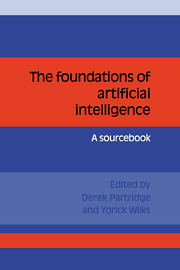Book contents
- Frontmatter
- Contents
- List of contributors
- Preface
- Acknowledgments
- 1 Introduction
- 2 The formal foundations of AI
- 3 Levels of theory
- 4 Programs and theories
- 5 The role of representations
- 6 The role of programs in AI
- What kind of field is AI?
- Programs in the search for intelligent machines: the mistaken foundations of AI
- 7 Rational reconstruction as an AI methodology
- 8 Is AI special in regard to its methodology?
- 9 Does connectionism provide a new paradigm for AI?
- 10 The role of correctness in AI
- 11 Limitations on current AI technology
- 12 Annotated bibliography on the foundations of AI
- Index of names
Programs in the search for intelligent machines: the mistaken foundations of AI
Published online by Cambridge University Press: 03 May 2010
- Frontmatter
- Contents
- List of contributors
- Preface
- Acknowledgments
- 1 Introduction
- 2 The formal foundations of AI
- 3 Levels of theory
- 4 Programs and theories
- 5 The role of representations
- 6 The role of programs in AI
- What kind of field is AI?
- Programs in the search for intelligent machines: the mistaken foundations of AI
- 7 Rational reconstruction as an AI methodology
- 8 Is AI special in regard to its methodology?
- 9 Does connectionism provide a new paradigm for AI?
- 10 The role of correctness in AI
- 11 Limitations on current AI technology
- 12 Annotated bibliography on the foundations of AI
- Index of names
Summary
Of course, unless one has a theory, one cannot expect much help from a computer (unless it has a theory).
Marvin MinskyIntroduction
Computer programs play no single role in artificial intelligence. To some, programs are an end; to others, they are a means. These two groups might be thought to contain those who think AI is an engineering discipline, and those who think AI is a science. This is only partially true; the real situation is more complicated.
The first group is by far the largest and contains many of the most prominent AI researchers. For example, in his book Problem Solving Methods in Artificial Intelligence, Nils Nilsson states that
Future progress in [artificial intelligence] will depend on the development of both practical and theoretical knowledge … As regards theoretical knowledge, some have sought a unified theory of artificial intelligence. My view is that artificial intelligence is (or soon will be) an engineering discipline since its primary goal is to build things. (1971, pp. vii-viii, his emphasis)
Barr and Feigenbaum (taking a slightly more cautious position) also claim that “whether or not [AI leads] to a better understanding of the mind, there is every evidence that [AI] will lead to a new intelligent technology” (1981/1982, p. 3, their emphasis).
Many researchers who see themselves as theorists or scientists also belong in this group because they think that the ultimate goal of their work on theory is to produce a computer program that does something useful, whereas in other disciplines, the goal of theorists and scientists is to produce a theory.
- Type
- Chapter
- Information
- The Foundations of Artificial IntelligenceA Sourcebook, pp. 223 - 234Publisher: Cambridge University PressPrint publication year: 1990
- 5
- Cited by

